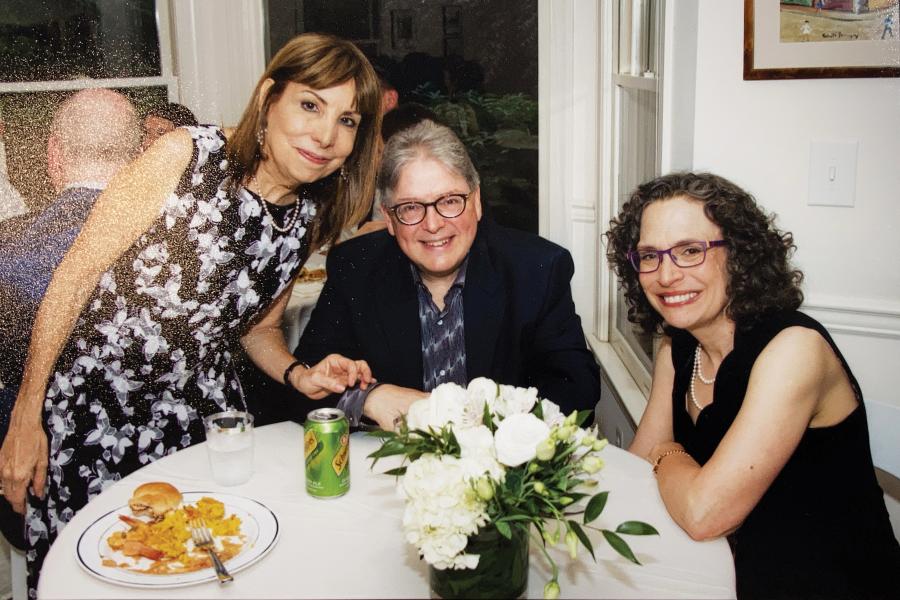Rhonda Schneider was sitting on the floor of Shaffer Hall, her hair curly and her nails painted black. Mindy Farber admired her right away. Their social anthropology course had yet to start, so Farber joined her on the floor. "We started talking, and then we sat together in class," Farber says.
It was 1971, and they were both in the first undergraduate class of students to include women at Johns Hopkins University. The two would form a friendship that spanned five decades. Today, Farber has chosen to honor Schneider, who died in January 2020, through an endowed gift to the university.
Farber, A&S '74, and Schneider, A&S '74, Ed '06 (MS), had a lot to tie them together. As two of the few women at Hopkins then, they both experienced wariness from men. "The male students in those years, no matter what class you were in, no matter how well you dressed or how provocatively—as soon as a woman came into the class, the men would get up and go sit in the back," Farber says. "It was every class, every department." Fortunately, this led to Rhonda meeting her husband, Luis Casas, A&S '73, who was among the few to stay seated that first day in the social anthropology class.
Farber and Schneider made the easy decision to move into Wolman Hall together after their first semester and remained roommates for the rest of college. After they graduated, with a degree in history for Farber and social and behavioral sciences for Schneider, their lives remained interwoven. They went to New York—Farber to NYU Law School and Schneider to the Columbia University Teachers College for a master's in vocational rehabilitation.
After that, Schneider married Casas and moved to Washington, D.C. A year later, Farber followed her to the District to work for the government, moving into the same apartment complex for a time. They stayed in the area and in each other's lives. Farber married, too, and they both had daughters within a year of each other—Emilie Adams, A&S '06, and Rachel Casas, Engr '06—who also became roommates at Hopkins.
Decades passed. Schneider had another daughter, Farber a son. Farber continued her law career, eventually starting her own civil rights practice. Schneider went back to school at 50 to get a master's in special education from JHU's School of Education. They spent birthdays and holidays with each other. "It was the kind of friendship where we did all the major things together," Farber says. "She was family." In 2008, Farber found out she had thyroid cancer, which was treated successfully. She was then diagnosed with chronic lymphocytic leukemia, also treated successfully. But it sent her into a depression that made her shun everyone for months. Finally, Schneider called to say her older daughter was getting married. "You better get on the phone right now because I can't have that wedding, and I can't be there, and I can't breathe, if you're not going to be there," Farber recalls Schneider telling her. The message brought Farber back. "From then on, our friendship was tighter than ever," she says.
By the spring of 2019, something didn't seem right with Schneider. She was usually a bubbly person, but now she was the one who seemed depressed; she was also having terrible headaches. In June, Schneider was diagnosed with glioblastoma, a brain tumor. "Glioblastoma is like octopus tendrils that spread out," Farber says.
The tumor was inoperable. Schneider wanted to die at home. Farber and her husband, John Camp, came every week to visit. One day, soon after her diagnosis, Schneider turned to Farber in tears: "You are the one I want to ask, have I done anything significant in life? Did my life have any meaning?" Farber hugged her and assured her that it did.
During another visit, toward the end of her life, Schneider turned to Farber's husband and said, haltingly, "Take care of Mindy. She takes care of everyone else."
Rhonda Schneider Casas died on Jan. 8, 2020. Because of the pandemic, a planned memorial service that spring was canceled. Farber couldn't stop thinking about what Schneider had asked her. So she and her husband, who had lost his identical twin brother, Thomas, to glioblastoma, decided to endow a gift to Hopkins for brain research, the John Camp and Mindy Farber '74 Endowed Award, "in part to honor a half-century of intertwined lives, a friendship that seemed like it would go on forever," Farber says. The fund also honors several other loved ones the couple has lost to brain conditions, including John's first wife, Jill Hollander Camp, and Mindy's prior husband, Edward Charles Schweitzer.
They want the money to go to undergraduate research that takes risks, she says. "The idea is to really support cutting-edge, take-a-gamble research that might lead to a breakthrough."
"Rhonda was just a very good, smart, decent person," Farber says. "And my answer to her question would be, I don't know what making an impact in life means. But I hope, somehow, she knows that we all think she's made enough of an impact for us to remember her in this way."








